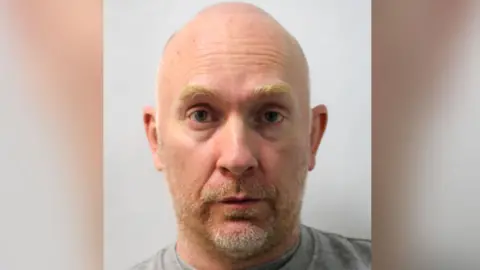Wayne Couzens: Ex-Met PC in flashing case guilty of gross misconduct
 PA Media
PA MediaA former Met Police officer who carried out a "lamentably poor" investigation into Wayne Couzens has been found guilty of gross misconduct.
Samantha Lee failed to make "the correct investigative inquiries" into two flashing incidents, a panel heard.
Couzens killed Sarah Everard in south-west London soon after exposing himself to staff at a branch of McDonald's.
During the hearing Ms Lee admitted she made some errors in the investigation, but denied gross misconduct.
She is no longer a police officer having left last year, but was a PC at the time.
 Met Police
Met PoliceThe police disciplinary panel heard Ms Lee carried out a "lamentably poor and rushed investigation" into the two incidents when Couzens exposed himself to female members of staff at the fast food restaurant in Swanley, Kent, on 14 and 27 February 2021.
The former PC went to the restaurant as part of her investigation on 3 March, just hours before Couzens kidnapped Ms Everard in Clapham.
The McDonald's manager told the hearing he had shown her CCTV of Couzens where his number plate was clearly visible, and showed her receipts which recorded the last four digits of Couzens' card.
She said he had told her the footage had already been deleted, a claim the hearing was told was a lie to cover up her failure.
Panel chairman Darren Snow found this dishonesty amounted to gross misconduct, and that had Ms Lee still been a serving officer, she would have been dismissed from the force. He added she will be barred from serving in the police again.
Reading the panel's findings, Mr Snow found that Sam Taylor, the McDonald's manager, was a "credible" witness and it was "inconceivable that he would not have shown her the CCTV evidence".
He added that the panel believed Ms Lee had been driven to dishonesty by the "pressure" of the investigation.
 Everard family
Everard familyIn her evidence, Ms Lee admitted she had made errors, but said nothing she could have done "would have changed the tragic outcome" of what happened to Sarah Everard.
"As much as I have thought it over and over, I don't believe that anything I could have done would have changed the tragic outcome of what happened later that day," she said.
Speaking outside the court, she claimed she has been made a "scapegoat" by the Met and said: "I have never lied".
In March this year, Couzens was sentenced to 19 months in prison after admitting three counts of indecent exposure.
He was already serving life behind bars for the kidnap, rape and murder of Ms Everard.
The third indecent exposure incident related to when Couzens exposed himself to a female cyclist on a Kent country lane in November 2020.

Analysis
By Sonja Jessup, BBC London's home affairs correspondent
Evidence heard by the panel has highlighted questions around the wider police response.
The 999 call, made by the McDonald's manager on 28 February, prompted the operator to run the registration details of the black Seat Exeo through the police national computer which confirmed it was registered to Wayne Couzens and gave his home address, but didn't show he was a serving police officer.
Paul Ozin KC, representing the Met, told the hearing there was "no standard check that takes place to see whether a suspect in criminal police cases are police officers".
This is an issue that's been previously highlighted by the chief constable of British Transport Police, Lucy D'Orsi, who wrote on a policing blog in January it was in her view "a priority issue for our attention".
The case will also raise questions once again over how police respond to indecent exposure offences, which campaigners believe need to be taken far more seriously.
The panel heard that the 999 call was initially treated as "comparatively low urgency".
Former PC Lee was not assigned to attend the scene until three days later. Just a few hours after she did, Couzens kidnapped Sarah Everard.
During the hearing Ms Lee accepted she "could have done more around CCTV and evidence gathering", but added she did not "believe that anything I could have done would have changed the tragic outcome of what happened later that day".

Now, the police watchdog, the the Independent Office for Police Conduct (IOPC) is calling for the introduction of a national system to ensure criminal allegations that are made against serving officers notify relevant police forces.
In a statement, the IOPC added it had already recommended the Met "consider developing a system automatically flagging when an officer is under criminal investigation".
The IOPC's director of operations Amanda Rowe said: "It may not have prevented Couzens from committing his crimes, but if it is combined with the change in culture that policing recognises is necessary, it could help prevent it from happening again in the future. That's why we'll be exploring this possibility of this with the NPCC later this week.
"We have also been working closely with the Angiolini Inquiry, sharing evidence to inform its work looking at cultural issues within policing and addressing the broader concerns around women's safety in public highlighted by Sarah Everard's death."
The Met's deputy assistant commissioner Stuart Cundy said: "As the panel has made clear, honesty and integrity are fundamental to policing and our relationship with the public.
"The wider circumstances leading to Sarah Everard's terrible murder will be considered by the Angiolini Inquiry and any subsequent inquest, and we are fully assisting them with their vital work.
"Fundamentally, I am sorry that Couzens was not arrested before he went on to murder Sarah Everard and we continue to think of her loved ones."
The force added it has been "taking steps to improve" the way it deals with allegations of indecent exposure - including ensuring investigations are led by specially trained officers, increasing capacity in intelligence teams to identify perpetrators and linked offences, and using a wide range of methods to identify sexual predatory behaviour and deter offenders.

Follow BBC London on Facebook, Twitter and Instagram. Send your story ideas to [email protected]
